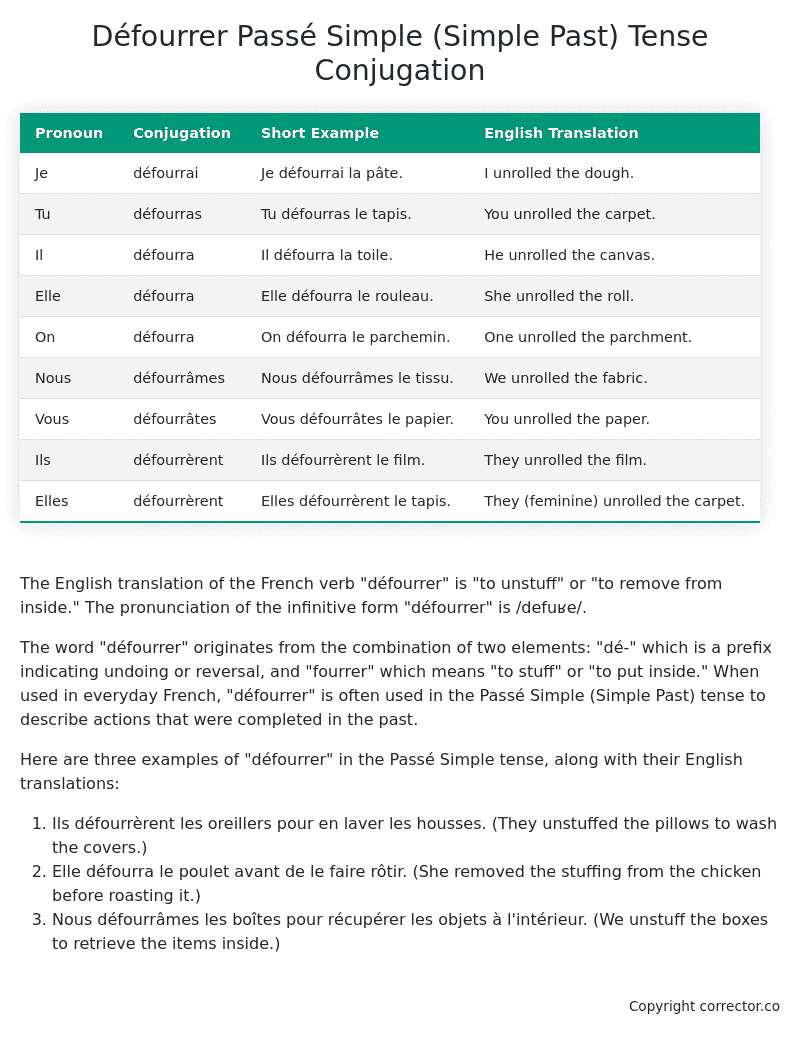Passé Simple (Simple Past) Tense Conjugation of the French Verb défourrer
Introduction to the verb défourrer
The English translation of the French verb “défourrer” is “to unstuff” or “to remove from inside.” The pronunciation of the infinitive form “défourrer” is /defuʁe/.
The word “défourrer” originates from the combination of two elements: “dé-” which is a prefix indicating undoing or reversal, and “fourrer” which means “to stuff” or “to put inside.” When used in everyday French, “défourrer” is often used in the Passé Simple (Simple Past) tense to describe actions that were completed in the past.
Here are three examples of “défourrer” in the Passé Simple tense, along with their English translations:
- Ils défourrèrent les oreillers pour en laver les housses.
(They unstuffed the pillows to wash the covers.) - Elle défourra le poulet avant de le faire rôtir.
(She removed the stuffing from the chicken before roasting it.) - Nous défourrâmes les boîtes pour récupérer les objets à l’intérieur.
(We unstuff the boxes to retrieve the items inside.)
Table of the Passé Simple (Simple Past) Tense Conjugation of défourrer
| Pronoun | Conjugation | Short Example | English Translation |
|---|---|---|---|
| Je | défourrai | Je défourrai la pâte. | I unrolled the dough. |
| Tu | défourras | Tu défourras le tapis. | You unrolled the carpet. |
| Il | défourra | Il défourra la toile. | He unrolled the canvas. |
| Elle | défourra | Elle défourra le rouleau. | She unrolled the roll. |
| On | défourra | On défourra le parchemin. | One unrolled the parchment. |
| Nous | défourrâmes | Nous défourrâmes le tissu. | We unrolled the fabric. |
| Vous | défourrâtes | Vous défourrâtes le papier. | You unrolled the paper. |
| Ils | défourrèrent | Ils défourrèrent le film. | They unrolled the film. |
| Elles | défourrèrent | Elles défourrèrent le tapis. | They (feminine) unrolled the carpet. |
Other Conjugations for Défourrer.
Le Present (Present Tense) Conjugation of the French Verb défourrer
Imparfait (Imperfect) Tense Conjugation of the French Verb défourrer
Passé Simple (Simple Past) Tense Conjugation of the French Verb défourrer (You’re reading it right now!)
Passé Composé (Present Perfect) Tense Conjugation of the French Verb défourrer
Futur Simple (Simple Future) Tense Conjugation of the French Verb défourrer
Futur Proche (Near Future) Tense Conjugation of the French Verb défourrer
Plus-que-parfait (Pluperfect) Tense Conjugation of the French Verb défourrer
Passé Antérieur (Past Anterior) Tense Conjugation of the French Verb défourrer
Futur Antérieur (Future Anterior) Tense Conjugation of the French Verb défourrer
Subjonctif Présent (Subjunctive Present) Tense Conjugation of the French Verb défourrer
Subjonctif Passé (Subjunctive Past) Tense Conjugation of the French Verb défourrer
Subjonctif Imparfait (Subjunctive Imperfect) Tense Conjugation of the French Verb défourrer
Subjonctif Plus-que-parfait (Subjunctive Pluperfect) Tense Conjugation of the French Verb défourrer
Conditionnel Présent (Conditional Present) Tense Conjugation of the French Verb défourrer
Conditionnel Passé (Conditional Past) Tense Conjugation of the French Verb défourrer
Conditionnel Passé II (Conditional Past II) Tense Conjugation of the French Verb défourrer
L’impératif Présent (Imperative Present) Tense Conjugation of the French Verb défourrer
L’impératif Passé (Imperative Past) Tense Conjugation of the French Verb défourrer
L’infinitif Présent (Infinitive Present) Tense Conjugation of the French Verb défourrer
L’infinitif Passé (Infinitive Past) Tense Conjugation of the French Verb défourrer
Le Participe Présent (Present Participle) Tense Conjugation of the French Verb défourrer
Le Participe Passé (Past Participle) Tense Conjugation of the French Verb défourrer
Struggling with French verbs or the language in general? Why not use our free French Grammar Checker – no registration required!
Get a FREE Download Study Sheet of this Conjugation 🔥
Simply right click the image below, click “save image” and get your free reference for the défourrer Passé Simple tense conjugation!

Défourrer – About the French Passé Simple (Simple Past) Tense
Formation
Usage
Narration
Historical Context
Interactions with other tenses
Passé Composé
Imparfait
Conditional and Subjunctive
Summary
I hope you enjoyed this article on the verb défourrer. Still in a learning mood? Check out another TOTALLY random French verb conjugation!


